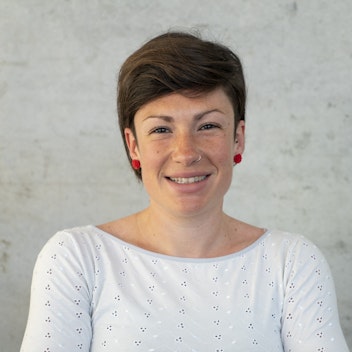
Election day: “Get vocal” the soundtrack for the EU Parliament Elections
 Martina Trettel
Martina Trettel
South Tyrol is a remote, well-kept, quiet place with idyllic mountain scenery. Such peacefulness is also predicated on its political situation, its peripheral character had turned the province into a sort of Gallic (political) village, oblivious to the instability that characterizes Italian politics, where changes of casacca by parliamentarians who cross the floor to join a different party and betrayals and government collapses are the order of the day. However, something seemed to break in 2013 when the South Tyrolean People’s Party (SVP) lost the absolute majority it had held for 65 years for the first time. In any case, the hegemonic status of the SVP (a party that according to its internal rules represents only the German- and Ladin-speaking communities) with quasi-messianic leaders such as Silvius Magnago or Luis Durnwalder was not total. In fact, according to South Tyrol’s consociational system of government members of the Italian-speaking community need to be incorporated into the provincial executive. This mechanism is a cornerstone of South Tyrol’s system of territorial autonomy.
This downward trend increased in the 2018 elections in which the SVP, with Arno Kompatscher as its top candidate, dropped to 42% of the votes and 15 of the 35 seats in the Provincial Parliament. The consolidation of new parties, including others from the German-speaking political spectrum, and the strength of the Lega as a result of its entry into the national government in Rome, changed the political landscape. From the usual SVP-PD coalitions, an SVP-Lega coalition government was formed in which the Italian community had two representatives for the first time.
The elections of last 22 October gave a new twist to the electoral map of South Tyrol, further fragmenting the Provincial Parliament that will now have 12 different parties, a product of its pure proportional system, without any kind of majority award or electoral barrier.
The SVP loss of support deepened, dropping to 34.5% and 13 seats, its worst result ever. Its coalition partner, the Lega, went from 11% to 3%, seeing its caucus reduced from the success of four representatives in the previous elections to only one. The erosion of the government after several internal crises in the SVP, the pandemic, and the economic crisis coupled with skyrocketing housing prices was within expectations. More surprisingly, however, voters also punished the main opposition force, Team K, which went from 15 to 11% of the votes, obtaining only four representatives compared to six in the previous election. For their part, the Greens maintained their three seats. Another disappointment was that of Fratelli d'Italia (Brothers of Italy), the party of Prime Minister Meloni, which barely improved its results to two seats, far from expectations.
The big winners of the election night were the German-speaking right-wing parties –a continuing trend present throughout Europe, with the exception of Die Freiheitlichen (The Freedomites), which kept its two seats. On the one hand, the Süd-Tiroler Freiheit, a secessionist party that aspires to reunify South Tyrol with Austria but that decided to leave secession in a drawer and focus on an anti-immigration drive in the final rush of the electoral campaign, earned it great results, doubling its support to four seats. On the other, the forces that could be described as anti-everything were also victorious, namely populist parties, born out of the anti-vaccine movement, with two main enemies in their sights: those responsible for the anti-covid restrictions and immigrants. These include the JWA of Wirth Anderlan (two seats), former commander of the Schützen (the folkloric association inspired in the Tyrolean militias for territorial defense), a position from which he was forced to resign after publishing a rap with racist, sexist, and xenophobic overtones, and Vita with one seat, the leading party of the anti-vaccine movement. Completing the Provincial Parliament, with one seat each, are two progressive Italian-speaking forces, the PD (Democratic Party) and La Civica (Civic List), and the former Minister of Health of the province, Thomas Widmann, has now been elected on a personalist project, after being forced to leave the government, beset by various scandals.
In any case, the results leave us with some important highlights or, rather, paradoxes. In the first place, what can be seen as a disastrous result for the SVP as a party, is a good result for President Kompatscher. Not only because he will repeat as the head of the government, something that was never in doubt, but also because his allies within the party were strengthened in the preferential vote, while those who have tried to run to succeed him – he will not be able to run again for reelection since he has exhausted the maximum number of mandates –or who have opposed him internally, have been badly affected.
Secondly, the serious crisis that the Italian parties are going through, unable to get their electorate to vote. Not even the presence of Meloni in the government or the fact that the Lega’s candidate was the highly valued mayor of the city of Laives, has succeeded in getting the members of this linguistic group to go to the polls. The causes are diverse and not always difficult to determine, but there seem to be three main factors. First, the Italian linguistic group does not seem to feel autonomy as its own, or at least does not value it as much as German speakers. Therefore, they do not feel the same civic need or duty to participate. Second, Italian speakers tend to live in urban areas, where turnout is significantly lower than in the rural areas which are mostly German-speaking. In addition, sociologically, Italian-speaking South Tyroleans seem to share the same apathy towards the political class as their fellow citizens in other regions of Italy, where abstentionism is only growing. This apathy is particularly detrimental, since the reduced number of Italian-speaking elected candidates means a decrease in their share in the government and in all those deriving from that proportion as well as losing the second representative they had counted on since 2018.
At first glance, the results seem to augur a complicated legislature. Forming a government will be complicated, but it will be even more difficult to achieve a certain stability that will enable projects to be carried forward and the legislature not to be derailed at the first moment of change. For the first time, the SVP will have to involve a German-speaking partner, be it Team K, the Greens, Die Freiheitlichen or, less likely, Süd-Tiroler Freiheit. However, the Greens’ position of strength has been reduced by the non-election of their leading Italian-speaking candidate, who was outvoted by a mere 100 preference votes. This results in two paradoxes: firstly, that the Italian candidate with the most votes was not elected, as she was outnumbered on her list by three other candidates, thus depriving the Greens of a comparative advantage with which to establish themselves as a key force in forming a government. What is even more paradoxical is that the candidate who beat her is bilingual, the son of a mixed marriage, but who chose to declare himself as German-speaking. Perhaps, 50 years after the approval of the Second Statute of Autonomy, the time has come to rethink the declaration/quota system.
In any case and in view of the results, three alternatives seem to be configured, all with pros and cons:
Whatever the triumphant option, a legislature of uncertain future lies ahead that will test the internal cohesion of the parties and their capacity to maintain equilibriums that might have seemed impossible until recently. In fact, it should not be ruled out that, in the purest style of the Parliament of Rome, changes of alliances may occur during the legislature, putting an end to that idyllic calm to which South Tyrolean politics had become accustomed. However, it should not be forgotten that there is no better cohesive force than power (think of the intrigues at Palazzo Chigi), since all those involved, no matter how many differences they may have, have a common interest and wish to preserve it, and not risk an uncertain outcome in new elections. After all, as far as politics is concerned, it seems that these "crazy Romans" are not so different from the inhabitants of the South Tyrolean village.

This content is licensed under a Creative Commons Attribution 4.0 International license except for third-party materials or where otherwise noted.